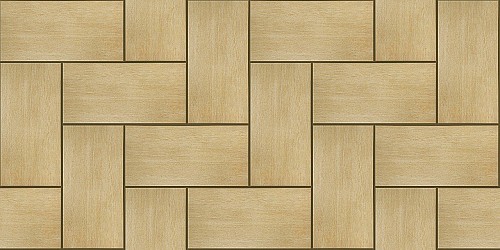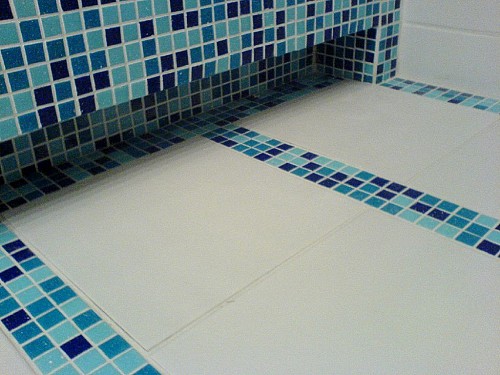How Much Does it Cost to Install a Ceramic Tile Floor?
Planning to replace your old floor with new ceramic tile? You can expect the labor cost to install a ceramic tile floor to range from $745 to $2,415 for 120 square feet (the size of a smallish kitchen or a large master bathroom). That works out to $0.50-$15.00 per sq ft.
The cost of the tile itself is additional and will depend on quality, size, and shape See "Types of Tile: Ceramic vs Porcelain vs Porcelain Wood" below.
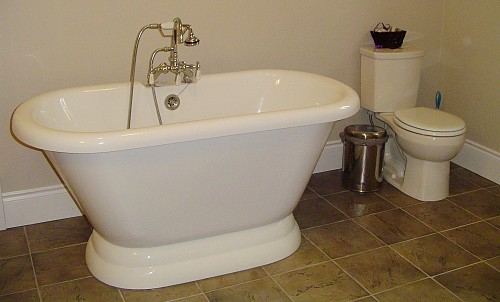
Factors in the Cost to Install Your Ceramic Tile Floor
- Size of the area to be tiled. Calculate the square footage of each floor that you plan to have tiled. Then add them all together.
- Size of your tiles. Standard ceramic tile sizes for flooring can be anywhere from 6” x 6” to 24” x 24”. Larger tiles are often faster to install, but may require additional cutting to fit your floor space. IMPORTANT: Tile size is measured before firing. The finished tile you buy will be about 10% smaller.
- Tile shape. Today’s tiles are available in a plethora of shapes. Choose from square, triangular, hexagonal (6-sided), octagonal (8-sided), and more. More unusual shapes frequently require more labor to install.
- Tile layout. Whether the tiles are to be laid out straight, offset, or diagonal is another consideration. in addition, take into account any peculiarities in the layout of the room, such as odd angles or tight corners.
- Design details. Are special details like borders or inserts part of your tile floor design plan? These add to the beauty of the completed floor, but are more labor-intensive.
- Condition of subfloor. New tile should only be laid over smooth, stiff subflooring in good condition, to minimize tile cracking. If the subfloor is uneven, rotted, or otherwise damaged, it will need repair or replacement.
- Grouting. Professional grout installation and sealing is another variable factor in the total cost of your floor.
- Your location. When you live in a remote location, contractors might charge more for travel time. And in some upscale areas such as Silicon Valley or the Hamptons, home improvement prices tend to be higher.
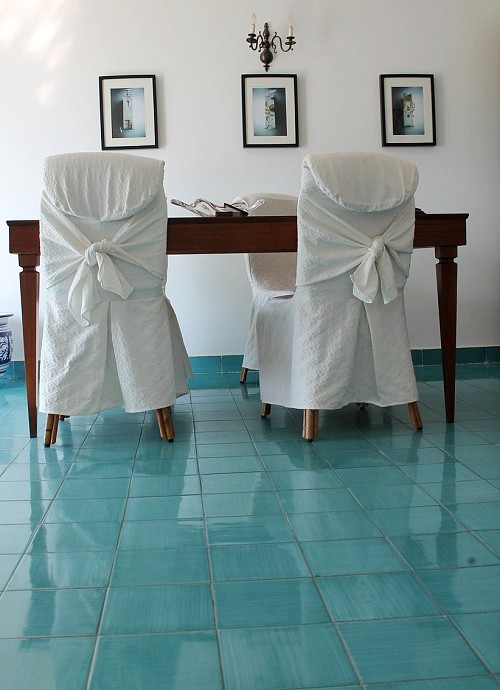
Types of Tile: Ceramic vs Porcelain vs Porcelain Wood
Ceramic tile is manufactured from red or white clay, molded and then baked (“fired”) in a kiln to dry and harden it. Most ceramic tile intended for indoor flooring is then coated with a protective glaze.
Cost of ceramic floor tile: $0.50-$7.00 per sq ft (not including labor).
Porcelain tile is referred to as a subset of ceramic tile, but the former is made from feldspar, fired at higher temperature. As a result it has a denser, finer texture than standard ceramic, making it more desirable and also pricier.
Cost of porcelain floor tile: $3.00-$10.00 per sq ft (not including labor).
Porcelain wood tile is trending in today’s home décor. It’s simply a type of porcelain tile planks that look like hardwood, but are water-resistant.
Cost of porcelain wood tile for floors: $3.00-$12.00 per sq ft (not including labor).
Pros and Cons of Ceramic Tile Floors
Pros
- Highly durable
- Virtually impervious to standing water
- Especially suitable for kitchens, bathrooms, mudrooms, laundries, and entranceways
- Stain resistant
- Wide variety of styles for every taste
- Works well with radiant floor heating system
- Manufactured from natural ingredients
- Doesn’t off-gas hazardous VOCs
- Holds up to pet scratching and “accidents”
- Easy daily cleanup
Cons
- Difficult to install
- Hard surface
- Can be slippery
- Cold underfoot (while this is a minus if you live in a cold climate, southerners may appreciate it)
- May crack if heavy object is dropped on it
- Grout maintenance involves annual cleaning and resealing
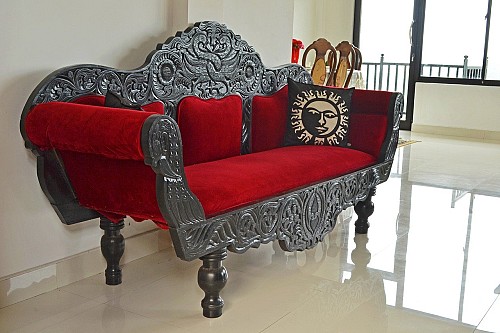
Ceramic Tile Floor Return on Investment
High quality ceramic tile flooring adds to your home value, much more than a cheaper-to-install product such as vinyl plank flooring. Savvy home buyers know that this material is both elegant and practical, and will last for years.
When you put your home on the market, be sure to have your grout cleaned and resealed before the first open house.
Cost Breakdown
Cost to install a ceramic tile floor will normally comprise:
- Tiles -- Standard ceramic floor tile is a reasonably priced floor covering, although elegant designer tiles can be much pricier. Porcelain ceramic is also more expensive, but is more durable and lower maintenance, as well.
- Subfloor installation or repair, if needed – Ensure your floor tile has a sturdy, level surface to rest on.
- Supplies -- Tools and supplies such as thinset tile adhesive, trowels, and screws are normally included in the cost.
- Labor -- If you want a complex tile design or if you need to have your sub-flooring replaced or reinforced is necessary, this will add to the cost of the ceramic tile installation.
- Cleanup -- The contractor’s estimate generally includes cleanup. However, demo and removal of existing flooring is likely to be an additional charge. Clarify who pays for what when you sign a contract for the project.
- Estimate -- The initial estimate, which may include onsite measurement, is often free.
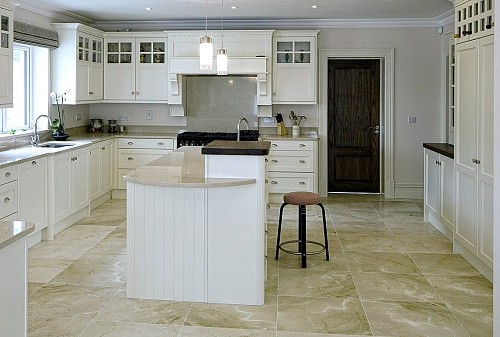
Get the Most for Your Money
- Ask for multiple quotes. Get estimates for your ceramic tile flooring project from up to four reliable contractors. Find who combines the best deal with the best service.
- Buy tile wisely. Measure your floor carefully and purchase 15-20 percent extra, if you are the one who's buying the tiles. You’ll need spares to allow for cutting and breakage during the install. Keep a few tiles on hand for the future, too. Tile designs are discontinued quickly, so make sure you'll have a match when you need to do repairs.
- Consider adding radiant underfloor heating now. If you've been thinking of upgrading or supplementing your heating system, now is the ideal opportunity to install radiant underfloor heating. Trendy tile and deliciously warm floors are a winning combo for bath or bedroom!
- DIY? Maybe not. Think again if you are considering tiling the floor as a DIY project. Cutting and laying tile is not a simple task, especially because the floor surface is often uneven. Professional tile contractors have the know-how to produce a floor that is not only good-looking but also waterproof and slip-resistant.
- But here’s how you CAN cut costs. If you’re determined to DIY, save money by demoing and removing the old flooring material yourself. Alternatively, if your existing floor is still in sound condition, ask your tile contractor if it's possible to have the tiles laid on top. CAVEAT: This will make the tiled floor higher than in the surrounding rooms.
Cost to Hire a Tile contractor
Articles and Tips
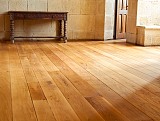
Wide Plank Flooring
How wide is wide? Wide plank is hardwood flooring made of strips wider than 3” to 3 ¼”.... Read More
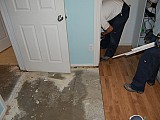
Help With A Water Damaged Subfloor
Photo of a water damaged subfloor by Moresheth/Flickr When you spill some liquid on a carpeted floor,... Read More
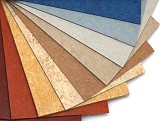
Adhesive Vinyl Floor Tiles
Ready for a new look in your kitchen or bathroom? Or perhaps your flooring is just starting to seem worn... Read More
